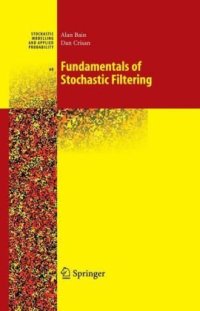
Ebook: Fundamentals of stochastic filtering
Author: Alan Bain Dan Crisan (auth.)
- Genre: Mathematics // Wavelets and signal processing
- Tags: Probability Theory and Stochastic Processes, Control Robotics Mechatronics, Numerical Analysis, Quantitative Finance
- Series: Stochastic modelling and applied probability 60
- Year: 2009
- Publisher: Springer-Verlag New York
- City: New York
- Edition: 1
- Language: English
- pdf
The objective of stochastic filtering is to determine the best estimate for the state of a stochastic dynamical system from partial observations. The solution of this problem in the linear case is the well known Kalman-Bucy filter which has found widespread practical application. The purpose of this book is to provide a rigorous mathematical treatment of the non-linear stochastic filtering problem using modern methods. Particular emphasis is placed on the theoretical analysis of numerical methods for the solution of the filtering problem via particle methods.
The book should provide sufficient background to enable study of the recent literature. While no prior knowledge of stochastic filtering is required, readers are assumed to be familiar with measure theory, probability theory and the basics of stochastic processes. Most of the technical results that are required are stated and proved in the appendices.
The book is intended as a reference for graduate students and researchers interested in the field. It is also suitable for use as a text for a graduate level course on stochastic filtering. Suitable exercises and solutions are included.
The objective of stochastic filtering is to determine the best estimate for the state of a stochastic dynamical system from partial observations. The solution of this problem in the linear case is the well known Kalman-Bucy filter which has found widespread practical application. The purpose of this book is to provide a rigorous mathematical treatment of the non-linear stochastic filtering problem using modern methods. Particular emphasis is placed on the theoretical analysis of numerical methods for the solution of the filtering problem via particle methods.
The book should provide sufficient background to enable study of the recent literature. While no prior knowledge of stochastic filtering is required, readers are assumed to be familiar with measure theory, probability theory and the basics of stochastic processes. Most of the technical results that are required are stated and proved in the appendices.
The book is intended as a reference for graduate students and researchers interested in the field. It is also suitable for use as a text for a graduate level course on stochastic filtering (suitable exercises and solutions are included).